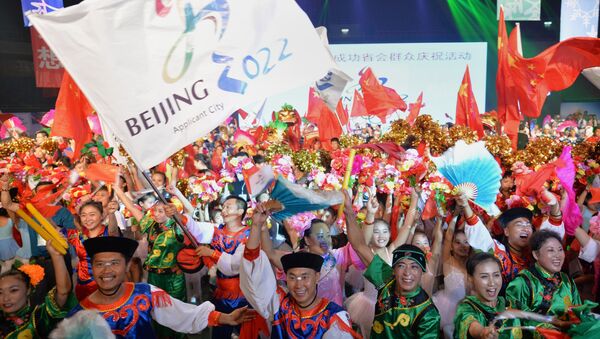"If your mother's feelings are not expressed out loud, they will become mental… they can only express their pain onto someone who they love the most: their children," the man shouted at the top of his lungs, his voice cracking, explaining why it is necessary they be treated like a doormat by their parents.
The video camera sweeps through rows of children crying in unison, some burying their heads in their sleeves, some pounding the ground. A high-pitched whine fills the air.
The video went viral a few weeks ago. It was shot at Shuozhou Experimental Elementary School in North China's Shanxi Province. The hysterical man with the microphone is Ouyang Weijian, a self-claimed educator who founded the Guangzhou-based Upside Down Education company and teaches "gratitude classes" all around the country with his team. He's one of many such educators who focus on the filial aspect of the traditional parent-children relationship in China, and apparently such classes still have a vast market.
Forced gratitude
To Ouyang, who goes by the name "Papa Ou," making children cry at the Shanxi elementary school was just another regular day, he had no idea it would be so controversial.
Ouyang tried to explain his side of the story on his Weibo on May 27, writing that he was invited to speak by the school and he did so for free, with no on-campus sales. He also called his teaching "gratitude education with positive vibes… with the goal of improving parent-children and teacher-student relationships." He thinks there are many parents in China who "do not know how to love, and it's bringing pain to their children."
The Global Times was unable to reach Ouyang for an interview as of press time. But a Beijing News article published on May 28, a few days after the video went viral, described Ouyang's day-to-day business at a class in Beijing's suburban Changping district. This time he chose to make the parents cry rather than their kids.
Finally, after hours of lecturing, Ouyang showed a few videos of children crying and reciting what personal changes they made after receiving "gratitude education." Many of the parents, touched by the videos, also started crying.
Ouyang is not the only one earning his living by promoting traditional notions of filial piety. A simple Baidu search turns up many more examples. Just last week, Li Chunjing, an "education expert," was invited by a vocational school in East China's Shandong Province to hold "gratitude lessons," according to a local newspaper.
He asked the students to stand face-to-face with their parents, hug them, caress their foreheads, look at their graying hair and wrinkles, then tell them how thankful they are. The students ended up in tears.
Even in their adult years, people who have received such lessons cannot forget them. A netizen surnamed Qin told the Global Times she remembers being forced to attend a "gratitude class" held by her elementary school teachers. After hours of lectures on why one should repay their parents, the teacher left a homework assignment that the students should go home, wash their parents' feet and write an 800-word essay about how they felt washing the feet due the next day.
Qin said she deliberately failed that assignment because she didn't feel comfortable with it, and neither did her parents.
The message of these lessons has also seeped into other aspects of Chinese society because they are sugarcoated in Chinese traditional values which still have wide appeal. There are a few public-interest advertisements that run regularly on China Central Television, one of which shows a little boy washing his mother's feet, and another shows a father with Alzheimer's hiding a bowl of dumplings away for his son, because he thought he hadn't eaten dinner yet.
Widespread business
Such lectures have become a profitable business in China. The Beijing Times reporter contacted Ouyang's group, posing as a parent, and a staff member said Ouyang can earn up to 100,000 yuan ($14,714) in one day.
A woman surnamed Yan told The Beijing News she first heard Ouyang speak in 2011 when she was going through a rough patch with her daughter. Then she convinced her husband to take her and their two children to hear him.
Controversy has always accompanied these events. Netizens bombarded the Shanxi school video, calling it cheap, phony and another example of money-making based on outdated values.
The Beijing News wrote that Ouyang's teachings have caused at least one man to split up with his wife. A farmer from East China's Zhejiang Province found out his wife attended four of Ouyang's camps, costing 200,000 yuan in total. He already had housing loans and other debts and tried to talk his wife out of spending their savings on these lessons. After throwing out her copies of Ouyang's books twice but still finding her determined to give Ouyang money, the farmer and his wife separated.
Wang Yuebing, a commentator on Tencent News, wrote that in Chinese tradition, being filial to one's parents would mean unconditional obedience so parents raise their children in order to get something in return, and in this day and age this value should not be promoted again.
"I personally don't like this kind of lecture, I think these children are being coerced into thanking their parents, it's just a show," Fang Gang, a professor of sexology at Beijing Forestry University, told the Global Times. He has held many classes and lectures on sex education and parent-children relations.
"Many parents nowadays feel they have given so much to their children and they feel unbalanced, like their children haven't given enough back, so they are giving their children such a great burden to bear," Fang said.
In recent years, it's become more and more common to see Chinese parents try to run their children's lives. In parks and public squares, it's easy to see parents holding signs covered with their children's information looking for dates.
In popular TV series Ode to Joy, about five young women living in Shanghai, most of the parents portrayed are not "normal." They either leech off their children's money, asking them to "pay" for years of parenting, or try to run their lives in in the name of love, asking their children to understand and appreciate their efforts.
"This is control, not proper education… it's domestic violence against one's kids," Fang said. "Gratitude should come naturally, if parents and children love each other."
This story was first published in the Global Times







